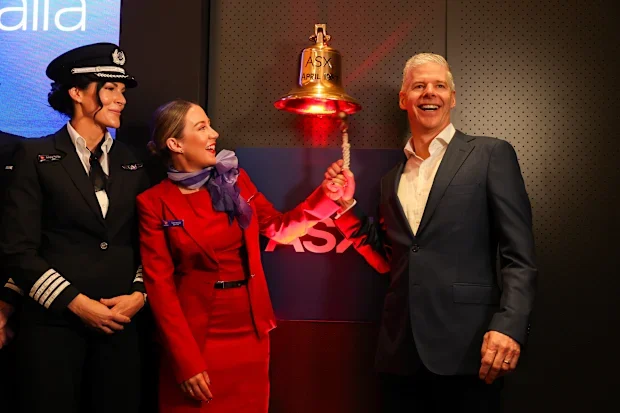Virgin Shares Surge on Market Debut, Boosting IPO Optimism

Virgin Australia shares soared on their debut on Tuesday as the market shrugged off global tensions, sparking hopes that a long spell of stasis in the initial public offering market may be ended.
Falling oil prices and reports of an Israeli-Iranian ceasefire boosted the mood, with Virgin shares trading under the symbol VGN up 7.5% on opening at $3.12.
Virgin CEO Dave Emerson described the crisis in the Middle East, which resulted in the diverting of two Virgin flights overnight, as "very distressing."
"But if I bring it back to our business, it reinforces how fortunate we are to be a 90% domestic Australian aviation company," Emerson told The Australian Financial Review before the offering.
"This is a calm pond of stable demand in the sea that is global aviation, which is much more prone to storms."
The new look Except for a wet lease with Qatar Airways, Virgin has avoided long-haul international flying. Its two planes, one from Sydney and the other from Brisbane, were forced to detour overnight after Iranian missiles were launched into Qatari territory.
However, in its prospectus, Virgin stated that the foreign flights posed no financial risk for the Australian carrier.
Virgin fell under voluntary administration in 2020 when the pandemic closed borders and reduced revenue. The airline was five times leveraged and unable to service its loans. The US private equity firm Bain Capital paid $700 million to assume its liabilities.
Five years later, Bain has relisted Virgin as a completely different airline, based on a single fleet of Boeing 737s that fly only domestically and to a few leisure destinations, including Fiji, Bali, and Vanuatu.
Emerson stated that Virgin will only invest shareholder funds in projects that create returns to increase seats at the same rate as GDP growth in a "focused and disciplined manner."
"We will only invest in businesses that will return more than our cost of capital. We'll only invest money where we're convinced we'll receive a return for our shareholders, whether it's fleet or anything else, and that's how we're running the company," he explained.
According to Emerson, the newly listed Virgin starts with historically low leverage compared to major airlines and plans to fund development through cash flow.
"We're starting from a strong position in terms of our balance sheet. "We believe we can fund our capital investments primarily through cash flow while remaining on the low end of the leverage ratio," he said.
Instead of investing in an international fleet, Virgin allows Velocity frequent flyer members to buy seats and redeem points on partner airlines such as Qatar Airways, Singapore Airlines, and United Airlines.
JPMorgan said Velocity had "significant value given the capital-light nature, high growth, and circular benefits provided to the airline business."
"At the moment, Virgin's Velocity program is significantly smaller than Qantas and has not seen the same level of growth over historical years," according to JPMorgan.
"That being said, there is a bull case to the future growth of Velocity as arrangements with major shareholder Qatar and other codeshares could open up additional routes and make the program more attractive for consumers (and hence retailers)."
At the $2.90 per share offer price, Virgin was priced 30% lower than Qantas. The larger airline, which will invest $15 billion in new planes in the following years, jumped more than 4% to $10.40 in early trade on Tuesday.
"Fortunately for Virgin - and unlike other recent IPOs - a large liquid competitor exists which provides somewhat of a benchmark in which to price the business," JPMorgan told investors.
"Irrespective of any company analysis, the Qantas share price and valuation will remain the main peg for assessing Virgin's valuation."
The broker stated that Virgin's free cash flow was nearing a peak and that gearing would increase as the company spent approximately $900 million on new capital expenditure.